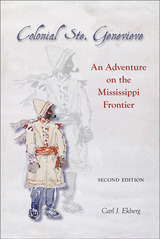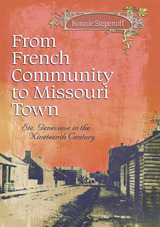3 books about Sainte Genevieve (Mo.)

Colonial Ste. Genevieve
An Adventure on the Mississippi Frontier
Carl J. Ekberg
Southern Illinois University Press, 1996
Colonial Ste. Genevieve: An Adventure on the Mississippi Frontier is a comprehensive, award-winning history of the French colonial town of Ste. Genevieve, from its founding in about 1750 to the Louisiana Purchase. Ekberg covers all aspects of the town during this period, including politics, agriculture, family life, and religion, and places Ste. Genevieve within the context of the history of the colonial Illinois Country.
[more]

Francois Vallé and His World
Upper Louisiana before Lewis and Clark
Carl J. Ekberg
University of Missouri Press, 2002
Winner of the Kemper & Leila Williams Prize in Louisiana History for excellence in historical scholarship for the year 2002, awarded by The Historic New Orleans Collection, The Louisiana Historical Association.
In François Vallé and His World, Carl Ekberg provides a fascinating biography of François Vallé (1716–1783), placing him within the context of his place and time. Vallé, who was born in Beauport, Canada, immigrated to Upper Louisiana (the Illinois Country) as a penniless common laborer sometime during the early 1740s. Engaged in agriculture, lead mining, and the Indian trade, he ultimately became the wealthiest and most powerful individual in Upper Louisiana, although he never learned to read or write.
Ekberg focuses on Upper Louisiana in colonial times, long before Lewis and Clark arrived in the Mississippi River valley and before American sovereignty had reached the eastern bank of the Mississippi. He vividly captures the ambience of life in the eighteenth-century frontier agricultural society that Vallé inhabited, shedding new light on the French and Spanish colonial regimes in Louisiana and on the Mississippi River frontier before the Americans arrived.
Based entirely on primary source documents—wills and testaments, parish registers of baptisms, marriages, and burials, and Spanish administrative correspondence—found in archives ranging from St. Louis and Ste. Genevieve to New Orleans and Seville, François Vallé and His World traces not only the life of François Vallé and the lives of his immediate family members, but also the lives of his slaves. In doing so, it provides a portrait of Missouri’s very first black families, something that has never before been attempted. Ekberg also analyzes how the illiterate Vallé became the richest person in all of Upper Louisiana, and how he rose in the sociopolitical hierarchy to become an important servant of the Spanish monarchy.
François Vallé and His World provides a useful corrective to the fallacious notion that Missouri’s history began with the arrival of Lewis and Clark at the turn of the nineteenth century. Anyone with an interest in colonial history or the history of the Mississippi River valley will find this book of great value.
[more]

From French Community to Missouri Town
Ste. Genevieve in the Nineteenth Century
Bonnie Stepenoff
University of Missouri Press, 2006
A small French settlement thrived for half a century on the west bank of the Mississippi River before the Louisiana Purchase made it part of the United States in 1803. But for the citizens of Ste. Genevieve, becoming Americans involved more than simply acknowledging a transfer of power.
Bonnie Stepenoff has written an engaging history of Missouri’s oldest permanent settlement to explore what it meant to be Americanized in our country’s early years. Picking up where other studies of Ste. Genevieve leave off, she traces the dramatic changes wrought by the transfer of sovereignty to show the process of social and economic transformation on a young nation’s new frontier.
Stepenoff tells how French and Spanish residents—later joined by German immigrants and American settlers—made necessary compromises to achieve order and community, forging a democracy that represented different approaches to such matters as education, religion, property laws, and women’s rights. By examining the town’s historical circumstances, its legal institutions, and especially its popular customs, she shows how Ste. Genevieve differed from other towns along the Mississippi.
Stepenoff has plumbed the town’s voluminous archives to share previously untold stories of Ste. Genevieve citizens that reflect how Americanization affected their lives. In these pages we meet a free woman of color who sued a prominent white family for support of her children; a slave who obtained her own freedom and then purchased her daughters’ freedom; a local sheriff who joined Aaron Burr’s conspiracy; and a doctor who treated cholera victims and later became a U.S. senator. More than colorful characters, these are real people shown pursuing justice and liberty under a new flag.
The story of Ste. Genevieve serves as a testament to Tocqueville’s observations on American democracy while also challenging some of the commonly held beliefs about that institution. From French Community to Missouri Town provides a better understanding not only of how democracy works but also of what it meant to become American when America was still young.
[more]
READERS
Browse our collection.
PUBLISHERS
See BiblioVault's publisher services.
STUDENT SERVICES
Files for college accessibility offices.
UChicago Accessibility Resources
home | accessibility | search | about | contact us
BiblioVault ® 2001 - 2024
The University of Chicago Press









